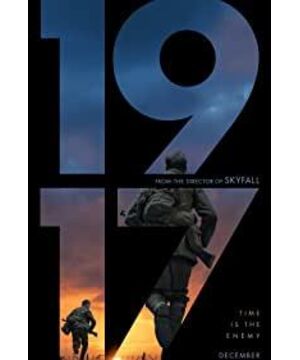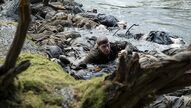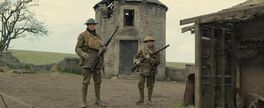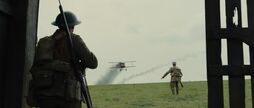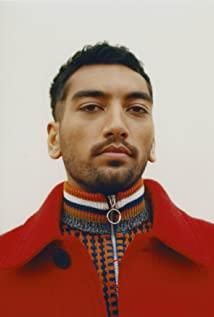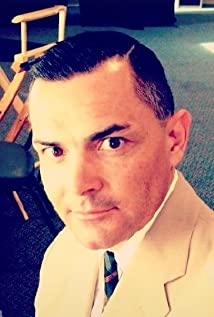Original address: http://www.qh505.com/blog/post/6088.html
From the first shot to the last shot, it is the only shot; from accepting the order to completing the task, it is a complete process-no simple switching between shots, no fade in and out, no montage, which must be executed in 8 hours The command moves towards the final completion in "One Mirror to the End". When the thrilling process of 9 Mile Road comes to an end in the long shot, the story that took place from April 6 to April 7, 1917 is actually the "War of One Man."
A long shot in the end. This singular state provides a background for the interpretation of "One Man’s War", but in fact, it is obvious that Sam Mendes’s processing can only be a kind of "pseudo-length" technically. "Lens", that is, it has the effect of one-shot in the image presentation, but it is actually a pseudo-long lens with editing, and the traces of this editing are very obvious: there are several black screens in the movie, or Is it a black screen created by obstacles, or a black screen created by light and shadow: Sergeant Blake received an order to go to Croisier Woods in the second district of Devonshire. When he took Scofield into action, he was in the trenches. When walking, the camera swept over obstacles. In this short one-second clip, the long camera has been broken; when two people enter the basement of the German retreat, when the rats inside will hang up for stealing food When the bag fell on the ground and caused an explosion, the footage was dark. This was also a chance to edit again; Schofield was injured in a confrontation with German soldiers in that house, and the footage turned black. Waiting for him When I woke up, a drop of water fell on my face. In the process, of course, the shots were edited and assembled for a long time... and even, Sam Mendes was designing this marching display to express a shot. In the end, there were obvious flaws in the technique. When two people passed a wall, Schofield passed through the wall with a gun, but it was obvious that the wall acted as a cover for the editing of the camera during the passage. The effect, but in the transition from one shot to the next, the scene of the wall has undergone a very strange change, which is very obvious proof that the shots have been stitched here...
Long shots are pseudo-long shots. This state of disguise is easy to ignore in the whole process. From a technical point of view, Sam Mendes’ intention to take a shot to the end is very obvious, that is, in a coherent plot. , In the same perspective, showing everything that happened in the middle of 8 hours and 9 miles, that is, under the leadership of the camera, let the audience experience the whole process-the audience is no longer a kind of observer identity, he intervenes In the plot, follow them, and even return to the battlefield in an immersive experience, back to 1917, back to a world full of suspense and unknowns-whether it is soldiers in ruins, debris, mud, rivers, trenches, or Faced with knives, bombs, shelling, whether it is an explosion in an underground bunker, or standing in front of the ruins of a church, whether it is a fierce battle in a small town, or struggling in the rapids of a waterfall, there is an immersive feeling.
For the immersive experience, the one-shot effect is adopted. This is Sam Mendes’ technical use, but when the shot is just a pseudo-long shot, when the editing traces do not need to be completely covered up, Sam Mendes What's the purpose of it? Moreover, 8 hours of story time has become 119 minutes of narrative time. The mirror of restoring meaning is only a pseudo-proposition. It is still fictional, and the editing is still completed in time. But in fact, the long shot highlighted by a single lens is a metaphor outside of technology. This singular state is entirely for the nature of the mission, that is, a war of one person. It is in a state of isolation. On the inevitable path, it is in the only process. The isolation, inevitability and uniqueness of "One Man's War" are first manifested in this order. The task of General Eling Moore to Sergeant Blake and Cosfield was to go to Croisier Woods in the second district of Devonshire and bring a letter to Colonel MacKenzie there asking them to stop the offensive tomorrow. , Because the German retreat is just an illusion, if you insist on attacking, you may sacrifice the names of 1,600 soldiers there. This task is related to the lives of 1,600 people in the two battalions, so it is very important. It cannot be hesitated. In the process of only 8 hours, they must complete the task without compromise.
The nature of the task determined that they had no retreat, but accepting the task from the beginning was not a "one-man war". Two sergeants Blake and Cosfield became the chosen ones. The two can take care of each other and help each other. From walking out of the trenches, to drilling through the barbed wire, to entering the underground bunker left after the German retreat, when the rats there detonated the bomb and Schofield was almost buried under the rubble, it was Blake who pulled him out. With his eyes unable to open, he crossed the dangerous shaft, and finally escaped to regain his freedom. In the process, if there were no Blake, then Scofield, who was only one person, might have died, and this one who had no way out. The mission became impossible. The 1,600 soldiers of the two battalions in the Croisier Woods would enter the trap of the Germans, and they would eventually die-but when they discovered that the German fighter jets had crashed, they tried to rescue them. When the enemy German pilot, a hidden knife stabbed Blake's body. With no ambulance station everywhere, Schofield watched him die, "Am I going to die?" Blay was dying. Kr asked, "Yes, you really are going to die." Scofield said, his face slowly became pale and gray, Blake finally died halfway, and the task of the two became one. people.
This is a very important turning point. From the whole group of soldiers lying resting in the woods by the river, to the two soldiers who were given orders, to the reality that only one person is left after Blake's sacrifice, from the plural to the singular, this is right. This is where Mendes used the pseudo-long lens technically. This is a solitary, unique and inevitable war. Only a one-person war can show the cruelty of war and demonstrate the spirit of a soldier. This intention was revealed from the beginning. It was not accidental that Blake accepted this mission, because his brother was in the second district of Devonshire. The general asked him to complete this mission, which is to connect national interests with his personal feelings. Together, I haven't seen my brother for a long time. On the one hand, completing this task allows him to meet his long-lost brother, and on the other hand, it allows him to establish the determination to complete the task, because once the plan fails, 1,600 including Blake brother Soldiers will become corpses. Blake was obliged to complete this task. When he accepted the task, he seemed to pull up Cosfield by his side at will. This contingency seemed to make Cosfield just a foil. Without his brother in front, he could not be possible. Like Blake, when he accepted the mission with personal emotions, and from the time he was reported to the general’s command by Blake to know the arduousness of the mission, Schofield had been hesitant, and even put forward “Why not give a grenade” "And when he rushed out of the trenches to start this difficult and dangerous journey, Schofield was also more of an assistant role. He followed Blake, showing lack of confidence, even stumbled, and his hand was cut by the barbed wire. , And being almost buried in the basement where Germany had just retreated is also a reckless performance.
Unlike Blake, as the selected person, Schofield did not enter the state from the beginning. He was a hesitator, a follower, an assistant and a foil, but his identity slowly changed, and This change is reflected in Mendes’ lens. From the start, Blake has always been the first point of view during the first half of the trip. He judges the situation and decides the direction. He tells Cosfield about Wilco’s ear bitten. The story tells of the grand scene of the cherry blossoms in their hometown, but when they passed the pond where the cherry trees were cut down, the perspective seemed to start to change. The camera followed Cosfield into a small wooden house, and Scofield carefully checked the inside. "It’s normal here." Then outside the window behind him, Blake with a gun was standing-at this time, Blake became his background and foil, and it was from here that Cosfield Became the dominant player and the first point of view. When Blake was stabbed in the body by a German pilot and finally died, he not only became a human war in the narrative, but also had no onlookers in the processing of the camera.
Why should Cosfield change from a hesitator and follower to a dominant one, and why should the second perspective become the first one? In fact, at the beginning, Schofield was a wanderer in war. He just followed Blake to perform tasks mechanically, because in his world, there was no brother or relatives he missed. He even told Blake’s is: "I hate going home." And he, who once made military exploits, exchanged his medal for wine with the French lieutenant in order to survive. This seems to Blake very puzzled, because the medal represents Honor, this is the highest pursuit of a soldier, and Schofield is totally inconsiderate. But when he witnessed Blake’s death, he seemed to have a deeper experience of the war. More importantly, Blake asked him to write to his mother before he died, and then died holding the blood-stained photo in his hand. . For Schofield, this scene almost experienced the baptism of the soul. He saw the place called home through the war and saw those who expected them to go home. So after Schofield agreed to Blake's wishes , Only when I gradually grow up, I use one person's shoulder to take all the responsibilities, and only then can I successfully complete the task in one person's battle.
He became resolute, resolute, and brave. When he met the troops on the road, he said to the officer: "I must go right away." When obstacles occurred, he refused to carry, "I have no time." Whether it is "I have to go" or "I have no time", it reflects a concept of time, because if Colonel MacKenzie is not found within 8 hours, Without stopping them from attacking, he gave up all his efforts, and the lives of those 1,600 people were gone; when he came to the small town of Exeter, he was shot by German soldiers. During street fighting, he saw a burning church standing in flames. His image before is a silhouette, like a wash of soul, is war an evil? He also met a French woman who had taken refuge in the small town. She took a rescued baby girl. Schofield regarded her as a friend and fed the child milk. When the child’s little hand caught him, he felt Warmth, perhaps this woman and this child made him feel at home, "They went out to sea on a sieve basket..." He even sang a song emotionally, and he reluctantly left in the eyes of the woman. In his opinion, the only purpose of completing the mission is to return home for all soldiers on the field.
After avoiding all the difficulties, Schofield has actually completed his personal growth. In the one-man war, he heard the song sung by the soldiers in the woods: "That fairytale land, I I'm going to set off, I'm going home, crossing the Jordan River and returning home..." The singing seemed to be his heartfelt voice. In fact, Schofield’s "War of One Man" is a sad existence in historical narratives, even an absurd metaphor, because he arrived at the prescribed time, but it was "you are late" because of the offensive. Partially unfolded. When Schofield ran to find Colonel MacKenzie, he was almost carried by the offensive team. A sense of absurdity appeared in the mix of horizontal running and vertical offensive. When Mackenzie The colonel picked up the letter. He said, "I thought it was a good day." The order to stop the offensive meant that this good day had become a fantasy and fiction. In fact, this kind of belligerent mood has been on the battlefield. It was pervasive that Scofield encountered another group of soldiers after Blake's death. The officer there said to him: "Some people like to fight." When he reminded Scofield to hand over General's letter to Colonel MacKenzie, "Someone must be present"-only the presence of others is a proof that the order will be truly executed. Therefore, for a belligerent commander, the war will not be stopped because someone sends an order. The only way to end this war is to "the last person dies"; and even if Schofield has completed the mission to save It killed 1,600 people, but the war will take more people away. Perhaps in another war, this group of surviving 1,600 people will eventually die on the battlefield.
War seems inevitable, but for a person, "war of one person" is a baptism, a growth. When the offensive stopped, Schofield walked to the grassy grass and leaned on a big tree. Then he took out a photo of his family and began to write to Blake’s mother: "He is a good man and always loves to tell stories. He saved me..." He is Blake, but he is also himself. He saved He also saved others. For Schofield, he experienced the hardest war in life, the test of life and death, the dazzling flares of the sun, and the existence of the small town like the Virgin and Child, floating. The river with corpses, the homesickness sung in the woods, and Blake's thoughts of returning home before his death... In a single shot, a person, a war, and "1917" are all in a state of isolation In, on the inevitable path, in the only process.
View more about 1917 reviews


